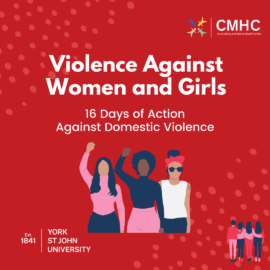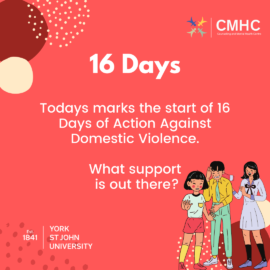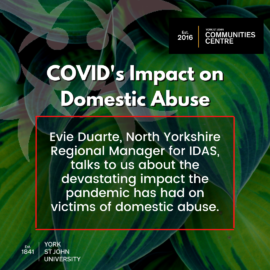Luisa is on placement with the Counselling and Mental Health Centre as a trainee Psychotherapeutic Counsellor, and has now joined our volunteer blog team, bringing with her a wealth of experience and knowledge. Today Luisa speaks to us about the myths and misconceptions of domestic abuse and violence.
“I recently started working for a domestic abuse charity. I had done my research after working in several different social care settings, I believed that I had a basic understanding of domestic abuse – but I was wrong. I am writing this blog in the hope that I can bring to your attention what domestic abuse really looks like, dismiss the myths and misconceptions, and in doing so, increase awareness.
As part of our induction, we were asked for words to describe our perception of domestic abuse; some of the words that people expressed were ‘volatile’, ‘spontaneous’, ‘impulsive’, ‘reactive’, and ‘impetuous’ – but I can tell you now, that in reality that is the exact opposite of what domestic abuse actually looks like.
Domestic abuse is often referred to as the ‘hidden crime’ because control is the key component. Gaining, and more importantly maintaining control, is what perpetrators strive for. Perpetrators know their victims well; they are intimate partners, and relationships are built on trust not secrecy, so in the early stages control can often be mistaken for affection or even attentiveness. However, as time progresses control often leads to the victim losing all their independence and self-worth, feeling isolated, no longer having the ability or the confidence to make balanced decisions and to recognise what a ‘healthy relationship’ should look and feel like.
A woman is killed by her male partner or former partner in the UK every four days, and 41% of women killed by a partner or former partner had recently separated or made plans to separate. 30% were killed within the first month and 70% in the first year, which I believe demonstrates the intense need for perpetrators to maintain control and what happens when they believe that they may lose it. I am sure you will agree that these statistics are shocking and scary, but they also help to explain the second great domestic abuse myth which is ‘they could just leave?’
After someone has been subjected to controlling behaviour for long periods, they often lose their whole identity and become totally dependent. Individuals suffering from physical violence will know what happens if they don’t conform, or what could happen to other family member or even a beloved pet, as a result of their defiance. Often to the outside world the abuser is a caring, loving partner and so the victim is afraid of not being believed, even by those closest to them. There can also be practical, cultural and financial reasons to stay, along with fear of losing custody or putting their children in extreme danger. Whatever the reasons, the risks post separation are greatly increased and so it is a decision that should not be taken lightly.
The final misconception that I wanted to address is that domestic abuse only happens to vulnerable people, and the thought that “it would never happen to me”. Domestic abuse affects all levels of society; there is no specific demographic and the consequences affect the lives of many not only the victim. If you have time, please check out the below TedTalk by Leslie Morgan Steiner, as I cannot think of a better way to dispel my final myth.
Although these statistics are quite frightening, there is support and help available. Organisations who specialise in domestic abuse will provide you with the support you need whether it is safety planning, relocation, improving your relationships, or even if you just need to speak to someone who understands what you are experiencing. If you are worried about your relationship or someone you know, I would urge you to contact someone for support – we have included a list of resources below.
And finally, thank you for taking the time to read my blog.”
Support Services
IDAS (Independent Domestic Abuse Services)
The leading specialist domestic abuse charity in Yorkshire. You can find out more information about IDAS on their website, and they run a Live Chat service between 3 pm – 6 pm Monday – Friday. Their trained workers offer non-judgemental, practical and emotional support, we will not tell you what to do.
Tel: 03000 110 110
All About Respect
All About Respect creates a space for open and honest dialogue within our student communities about healthy relationships. Students can access support information as well as report any incidents of sexual violence, harassment, domestic abuse or hate crime.
Women’s Aid
Women’s Aid work to ensure women are believed, know abuse is not their fault and that their experiences have been understood. If you’re unsure you’re in an abusive relationship, you can take their short test here to see – https://www.womensaid.org.uk/the-survivors-handbook/am-i-in-an-abusive-relationship/
Email: helpline@womensaid.org.uk
Respect
Respect – Men’s Advice Line, provide support for male victims of domestic abuse; from legal information and advice, housing and homelessness, family and children, divorce and separation, mental health, counselling, LGBTQIA+, finance, immigration, abuse and sexual abuse.
Email: info@mensadviceline.org.uk
Tel: 0808 8010327
Refuge
Refuge is a York independent Domesttic Abuse Service, which supports women and children who experience all forms of violence and abuse, including domestic violence, sexual violence, female genital mutilation, forced marriage, so-called ‘honour’-based violence, and human trafficking and modern slavery.
Tel: 01904 622994
Hourglass
Hourglass have nearly 30 years’ experience as Action on Elder Abuse and over that time our work has touched tens of thousands of people, it’s shaped government policy and amplified the issue in national press. As the UK’s only charity focused on the abuse and neglect of older people, they staff a free-to-call helpline. It’s an absolute lifeline for older men, women and their families suffering from the five forms of abuse: physical, psychological, financial, sexual or neglect.
Tel: 0808 808 8141
Victim Support
Victim Suport provide a robust, professional and consistent support service to all victims of domestic violence, including specialist support for young victims, male victims and those suffering domestic abuse within same-sex relationships. They work with specialist domestic violence organisations and the police, and we also employ the largest number of Independent Domestic Violence Advocates (IDVAs) across England and Wales.
Tel: 0808 1689 111
ManKind Initiative
They provide an information, support and signposting service to men suffering from domestic abuse from their current or former partner. This can range from physical violence or object throwing to abuse such as constant bullying or insults. The helpline is a listening service which provides emotional support, practical information and signposting.
Tel: 01823 334244
Kyra
Kyra are a registered charity in York that exists to help local women make positive change in their lives. We offer a range of courses, therapies, life skills and events for women, all from their relaxed, comfortable, city centre location. Their door will always be open until every woman in our area feels safe, supported and able to be the person they were always meant to be.
Email: contact@kyra.org.uk
Tel: 01904 632332
_______________________________________________
References
https://www.endviolenceagainstwomen.org.uk/wp-content/uploads/Costs_of_Freedom_Report_-_SWA.pdf



